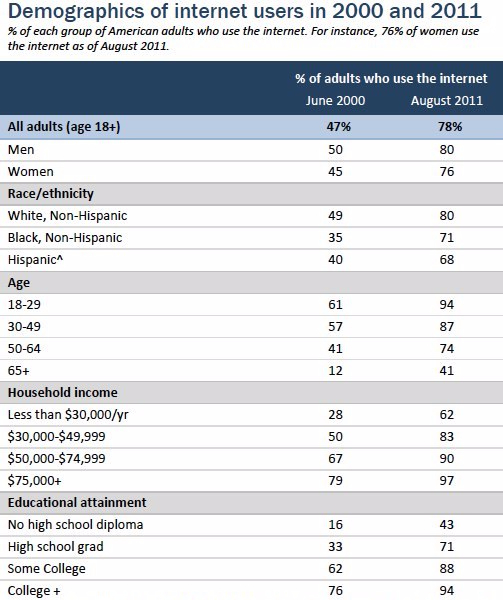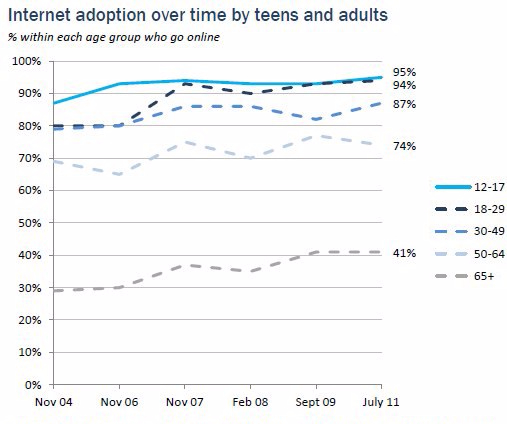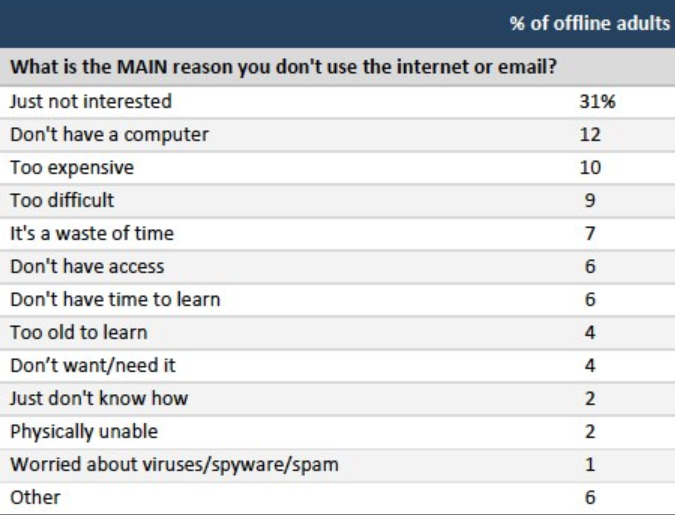In our generation, the web has been deeply embedded in our daily lives that it is deemed as a necessity in our work, social lives or education. However, 53% of the world’s population are not using the Internet.

There is an increasing trend of internet adoption even if digital differences on internet interaction still exists in terms of age, gender, class, race and economic culture.
During the earlier stages, technology and smartphones were only for those who could afford it, but this is definitely not the case anymore! In today’s digital world, the internet plays a huge role and many people are adopting the use of it, including myself.

Are there stark differences between those who were using the Internet and those who don’t?
Digital differences, digital divide also looks at those people who are able to assess to the Web, but don’t want to despite the increasing Internet penetration.

Majority of the population are “Just not Interested”. This tends to lean towards the older generation (like my parents) where they prefer to stick to their norms and not adapt to changes due to their lack of knowledge for modern technology.
Personally, as a student in this era, I believe that I am privileged in terms Internet usage for many purposes especially education. At a tender age of 7, during primary education – I was required to have broadband at home as learning portals are used online to help me further understand what we are learning apart from the traditional classroom lessons. As I move on to higher education, the internet is a vital tool when it comes to research, discussions and having sharing forums to express our ideas which aids in my learning.
Hence, I feel that everyone should be positive and accepting towards the use of technology as it has a degree of significance in our lives.
(306 words)
REFERENCES
Retrieved 10 Nov 2017, “Digital Differences” by Kathryn Zickuhr and Aaron Smith
http://www.pewinternet.org/2012/04/13/digital-differences/
Retrieved 10 Nov 2017, Professor Susan Halford, Dr Huw Davies and Jo Dixon
https://www.futurelearn.com/courses/learning-network-age/3/steps/263013

Hello Denise, I agree with your point on how the Internet has slowly evolved into a requirement in a student’s life. Your example of your personal experience with Internet for education, was very relatable. I use the Internet to do a lot of research and even clarify about certain topics that were covered in lectures too! I also think that the graphic that you used, made it easy to understand the various reason that non-internet users, choose to not use the internet. I feel that most non-users are unaware of the many pros of the internet and do not bother finding out, which also leads to them missing out on the conveniences that are life-changing.
(115 words)
LikeLiked by 1 person
Hi Rachel,
Thanks for taking the time to read my post! Yes, I agree with your point on where non-uses do not bother to find out more about the pros of Internet usage, which is why I feel that more people should be accepting towards it and give it a shot before immediately shunning it!
LikeLike
Hello!
I like how you were able to highlight the breakdown of internet users according to their demographics as it gives a clearer insight on non-internet users. Additionally, there is a clear distinction of the ‘why’ that these non-users have.
Your post has prompted me to do extra research as well, to see if there are any differences between different generations of users who use the internet. (bit.ly/2mjKSC1) However, as a marketer, I was hoping to gain a better understanding of the habits of internet users versus yours, and perhaps a more localised context of digital differences. (bit.ly/2owI2d3)
Do also note that the data has figures that date back more than half a decade ago, so finding more recent figures will definitely help readers to understand the gravity of the situation.
Here’s a link that may be useful for you: bit.ly/1NiVKof
Hope that helps!
-Jerrom
(144 words)
LikeLike
Hi Jerrom,
I have read through the articles that you have given, and it seems to be that social media has had a great impact on children these days! In my opinion, if children are using the Internet for educational purposes (like watching Youtube videos to learn), it is perfectly fine – of course with the guidance of their parents. But, kids are having Instagram accounts at the age of 6!? I feel that they are too young to be exposed to such!
Sure, I’ll take note on the data as well as my online habits and incorporate that in my upcoming reflection post! Thanks for the advice.
LikeLike
Great Thoughts Denise! I like how you addressed all the types of digital differences. I totally agree with your point that the internet has played an important in helping us to learn through the learning portals, assessing information, connecting with like-minded through online forums and getting useful information from digital platforms for the project and school discussions. Without the internet, it could have been a challenge for me to learn and understand easily. However, people are still unable to afford the internet. They are deprived of learning more from the web. From your thoughts, you mentioned that in today’s digital world, everyone is assessing it easily. Therefore do you think those people in rural areas in certain parts of the world is able to assess internet easily? Lastly, do you think digital visitors can be convinced with help from social media or other sources to use the web more regularly?
{150 words}
LikeLike
Hi Sahana,
Thanks for taking the time to read my post! I’m glad that you agree to my points on the Internet being of great use to students for educational purposes. To address your questions, I have done some research on them:
1) It is no doubt that rural areas are still having problems in terms of getting access to the Internet. However, research has shown that broadband adoption can help improve the economy in these rural areas which can cause a detrimental change in terms of their country’s well-being. Many countries are aware of this and are putting in efforts to help ease the accessibility of the Internet usage for rural areas. For example, in the United States, the federal government has tried to provide infrastructure in rural areas – by developing the “Connect America Fund (CAF)” which initially offered US $10billion in subsidies to telecom companies to offer services to unserved areas. This would increase the opportunities of the accessibility of the Internet for rural areas, though they may be slower in terms of connectivity rates, which is why experiments are still on-going!
2) In our era, the internet is vital and technology is constantly improving which is why I feel that people should be embrace it and not be resistant to change. In my opinion, Digital Visitors tend to be people from the older generation who lack the knowledge and skills to access the Web. This is because they are not widely exposed to it since young. In order to bridge the gaps and convince them to be more active online, a way could be to show them the positive sides of using it. For example, a recommendation by Dr Anja Leist of the University of Luxembourg stated that “Older adults can use social media to access health-related information and engage in patient-to-patient-doctor conversations, (as) there are many online forums …… where people provide social support.” Alternatively, from a more personal point of view, they can just use social media to keep in contact within their own social circle and group of friends and family just as a way to maintain relationships with their loved ones. These can be ways to persuade them to use the Web more frequently.
I hope this helps! (:
References:
http://theconversation.com/technology-is-improving-why-is-rural-broadband-access-still-a-problem-60423
https://www.consumeraffairs.com/news/how-social-media-can-benefit-seniors-041713.html
LikeLike
Thanks Denise helped alot:)
LikeLike